

Who owns your downloaded music after you die? Earlier today, a story emerged from the British tabloids that Bruce Willis was considering suing Apple in a bid to determine who gets his iTunes music collection after his death.
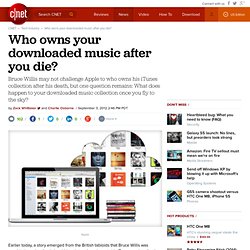
Perhaps something more suited for April Fool's Day? We reported it (and fell for it) and we've updated the piece to reflect that the original source was a work of fiction.
DAP TRUST. Steam (software) Prior to Steam, Valve had problems releasing updates for their online games, such as Counter-Strike, wherein a patch would result in the disconnection of the larger part of the online user base for several days.
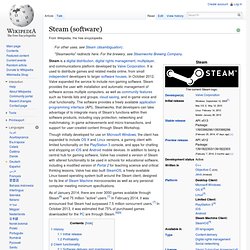
They decided to make a platform which would update games automatically, and implement better anti-piracy and anti-cheat measures. Valve originally approached several companies – including Microsoft, Yahoo! , and RealNetworks – to build a client with these features, but were turned down.[10] Steam's development began at an uncertain date prior to 2002. Working titles included "Grid" and "Gazelle".[11] It was revealed to the public on March 22, 2002 at the Game Developers Conference, and was presented purely as a distribution network.[12] To demonstrate the ease of integrating Steam to a game, Relic Entertainment created a special version of Impossible Creatures.[13] However, the game was ultimately not released on Steam. What Happens To All That Digital Goodness You Have Purchased After You Die? With the proliferation of digitally distributed content, the question of ownership is always looming overhead.
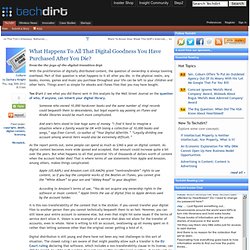
Part of that question is what happens to it all after you die. In the physical realm, any books, movies, games and music you purchase throughout your life can be left to your children and other heirs. Things aren't so simple for ebooks and iTunes files that you may have bought. Tex D'urt (I see what you did there) sent in this analysis by the Wall Street Journal on the question of who, if anyone, can inherit your digital library. Someone who owned 10,000 hardcover books and the same number of vinyl records could bequeath them to descendants, but legal experts say passing on iTunes and Kindle libraries would be much more complicated.And one's heirs stand to lose huge sums of money. Valve. Appeals Court Destroys First Sale; You Don't Own Your Software Anymore. Earlier this year, we noted that the 9th Circuit appeals court was facing three separate important cases about the "first sale doctrine.
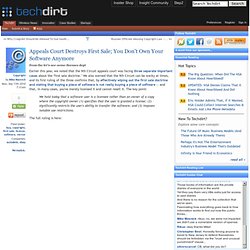
" We also warned that the 9th Circuit can be wacky at times, and its first ruling of the three confirms that, by effectively wiping out the first sale doctrine and stating that buying a piece of software is not really buying a piece of software -- and that, in many cases, you've merely licensed it and cannot resell it. The key point: We hold today that a software user is a licensee rather than an owner of a copy where the copyright owner (1) specifies that the user is granted a license; (2) significantly restricts the user's ability to transfer the software; and (3) imposes notable use restrictions.
The full ruling is here: UsedSoft and the principle of exhaustion: CJEU ruling published today. Dear IPKat readers, This is my first post as a guest Kat, and I am indeed looking forward to these months together.
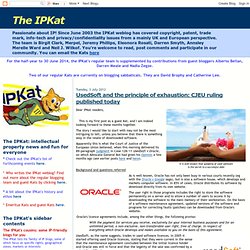
The story I would like to start with may not be the most intriguing to tell, unless you believe that there is something sexy in the resale of downloaded software. Apparently this is what the Court of Justice of the European Union believed, when this morning delivered its 89-paragraph judgment in Case 128/11 UsedSoft v Oracle, on which Advocate General Bot had given his Opinion a few months ago (see earlier posts here and here). Background and questions referred. La mort numérique : choix de l'oubli, droit à la copie. Vous venez de mourir.
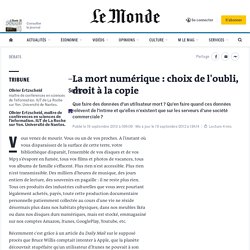
Vous ou un de vos proches. A l'instant où vous disparaissez de la surface de cette terre, votre bibliothèque disparaît, l'ensemble de vos disques et de vos Mp3 s'évapore en fumée, tous vos films et photos de vacances, tous vos albums de famille s'effacent. Plus rien n'est accessible. Plus rien n'est transmissible. Des milliers d'heures de musique, des jours entiers de lecture, des souvenirs en pagaille : il ne reste plus rien. Digital libraries as modern Charon's obol? Like the coin which was buried with the dead person, it seems that a similar fate may now be reserved to one's own digital libraries.

A few days ago an intriguing article was published on The Wall Street Journal, attempting to provide an answer the following question: Who inherits your iTunes library? Well, the response seems to be ... no one. As is well known, analogue copies of books and music (CDs, vinyl) pass into the hands of one's own heirs upon death. However, this may not be the case when it comes to iTunes or Kindle libraries. In fact, purchasers of digital works just get a licence to use the digital files, but do not actually own them.